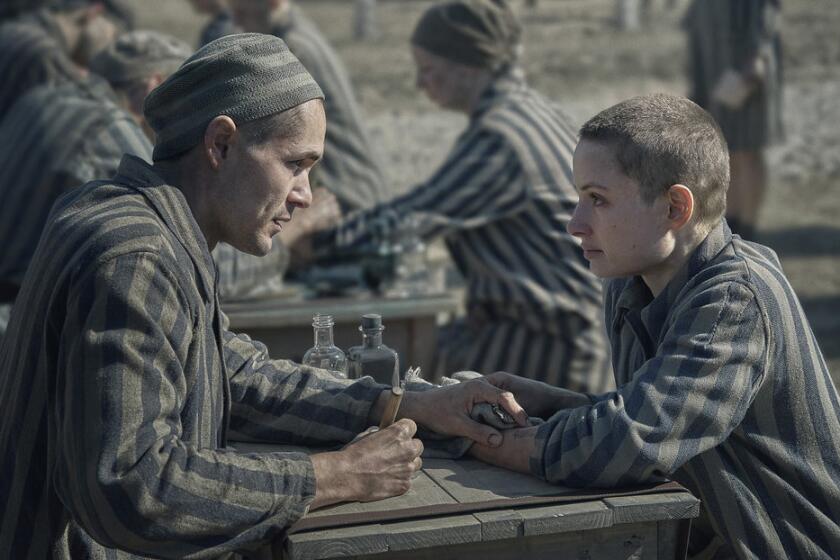Don’t get your hopes up for ‘Raising the Bar’
“Raising the Bar” is an underwhelming new legal drama from Steven Bochco, still of “NYPD Blue” fame, and David Feige, a lawyer and writer. (“Indefensible,” Feige’s well-reviewed book about his experience as a public defender in New York City, is partly the inspiration for the series.)
It begins tonight on TNT and, not to knock basic cable -- indeed, it’s where the action is -- but this is not a show likely to have washed up on the shores of a broadcast network. It’s not all bad, but nothing in it argues that it needed to be made other than to give the people who made it something to do. It’s a mediocre misfire in which the odd good parts beg for a better home.
The series focuses on an intertwined group of young lawyers in the big city. Some are working for the district attorney, others for the public defender, and one clerks for a judge. They want both to see justice done and to win their cases, which do not always amount to the same thing. But that the justice system is frequently nothing of the sort isn’t exactly a novel theme; nor is the twin focus on prosecution and defense particularly new.
The rot in the Big Apple hall of justice is singly embodied by Jane Kaczmarek’s Judge Trudy Kessler, a by-the-book power junkie who brings out the offended crusader in long-haired defense attorney Jerry Kellerman (Mark-Paul Gosselaar, in a role that would have been played by Timothy Hutton a generation ago). Perhaps he’s just upset because she seems to be the only judge who’s ever assigned to his cases.
Jerry, who feels his clients’ pain seemingly more than they do, is the vehicle for the viewer’s own righteous indignation, and despite the seen-from-both-sides premise of the series, all the moral authority -- at least in the three episodes offered for inspection -- accrues to the defense and the defendants. (Even when they’re guilty, they’re not guilty of much.) The prosecutors are good only insofar as they see their way clear to helping out the other side. The rest is “Catch-22.”
As to the circle of friends the cast is supposed to represent, they’re more a collection of attitudes than of characters; in and out of the office, they tend to posture rather than converse. (“Remind me why we’re friends,” prosecutor Marcus McGrath, played by J. August Richards, asks Jerry, after being hit up for a favor; it seems a reasonable question.) Defender Jerry is sleeping with prosecutor Michelle Ernhardt (Melissa Sagemiller), at least until she gets one of his witnesses deported to win a case. Rich-boy Richard Patrick Woolsley III (Teddy Sears) has rejected the corporate path to defend the otherwise defenseless, when not hitting on his boss (Gloria Reuben, “ER”).
Reuben’s Roz Whitman is a caring mother hen in contrast to smart-but-vile Assistant Dist. Atty. Nick Balco (Currie Graham, “Boston Legal”), who sexually harasses Michelle, who in turn calls his bluff, jumping onto his lap and then impugning his manhood -- as if! Natalia Cigliuti is Bobbi Gilardi, imported into the public defender’s office after the pilot in order that there be at least one character with street smarts. And finally, there is Judge Trudy’s clerk and ambitious boy-toy, Charlie Salansky (Jonathan Scarfe), who is secretly gay.
In “Hill Street Blues,” “L.A. Law” and elsewhere, Bochco helped define the mix of the personal and professional that continues today in such shows as “Grey’s Anatomy,” but his timing is off here. “Raising the Bar” stumbles and lumbers, and even after three episodes its main characters remain ciphers.
And while I wouldn’t dream of questioning Feige’s knowledge of what goes on around a courthouse, knowledge is not drama. Even were every single event and utterance enacted here something he participated in or witnessed, little of it has been rendered in a way that makes you believe it, or care, in spite of that.
--
--
‘Raising the Bar’
Where: TNT
When: 10 p.m. today
Rating: TV-14 (may be unsuitable for children younger than 14 with advisories for suggestive dialogue and coarse language.)
The complete guide to home viewing
Get Screen Gab for everything about the TV shows and streaming movies everyone’s talking about.
You may occasionally receive promotional content from the Los Angeles Times.




